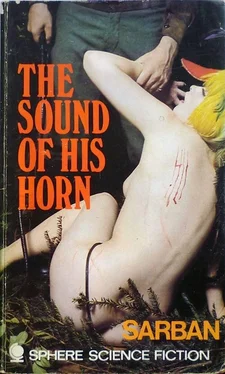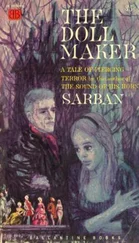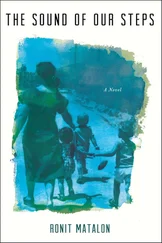Сарбан - The Sound of His Horn
Здесь есть возможность читать онлайн «Сарбан - The Sound of His Horn» весь текст электронной книги совершенно бесплатно (целиком полную версию без сокращений). В некоторых случаях можно слушать аудио, скачать через торрент в формате fb2 и присутствует краткое содержание. Жанр: Альтернативная история, на английском языке. Описание произведения, (предисловие) а так же отзывы посетителей доступны на портале библиотеки ЛибКат.
- Название:The Sound of His Horn
- Автор:
- Жанр:
- Год:неизвестен
- ISBN:нет данных
- Рейтинг книги:4 / 5. Голосов: 1
-
Избранное:Добавить в избранное
- Отзывы:
-
Ваша оценка:
- 80
- 1
- 2
- 3
- 4
- 5
The Sound of His Horn: краткое содержание, описание и аннотация
Предлагаем к чтению аннотацию, описание, краткое содержание или предисловие (зависит от того, что написал сам автор книги «The Sound of His Horn»). Если вы не нашли необходимую информацию о книге — напишите в комментариях, мы постараемся отыскать её.
The Sound of His Horn — читать онлайн бесплатно полную книгу (весь текст) целиком
Ниже представлен текст книги, разбитый по страницам. Система сохранения места последней прочитанной страницы, позволяет с удобством читать онлайн бесплатно книгу «The Sound of His Horn», без необходимости каждый раз заново искать на чём Вы остановились. Поставьте закладку, и сможете в любой момент перейти на страницу, на которой закончили чтение.
Интервал:
Закладка:
It was easy for the first three days of my visit to Thorsway–until Alan's mother spoke to me. Then, by very quietly and sadly asking me what was wrong with Alan, she forced me to recognise the change in him. It was as if she thought that I who had been his closest friend all through his school and university days would hold the key, or could pay the ransom of that part of his mind which was still held captive somewhere. That was how she put it: «They» had sent back his body, more or less sound, and so much of his wits as would carry him through the daily business of managing the small farm his father had left him, but they had kept the rest behind. What had they done to him? Or what had he done to himself during his four years in a prisoner of war camp?
I tried uncomfortably to evade the role of amateur psychiatrist that this confidence seemed to invite me to assume. I uttered some generalisations about war experience and the monotony of prison life–such commonplaces as my memories of conversations with a good number of other former prisoners of war suggested to me; and, besides, I added, perhaps unkindly, Alan was ten years older; she could not expect the boy in him to live for ever. She shook her head. «It's something more personal than that, and I'm sad mainly for Elizabeth's sake.» I could but try to assure her half-heartedly that I did not notice so great a change in him.
Certainly the other people there in the drawing-room that particular winter evening seemed to take Alan's inaction or absence of mind for granted, and they had known him well before the war. I think they had no more expected him to intervene in the argument than I had.
There were the Hedleys and their daughter, Elizabeth. Major Hedley was an old neighbour of the Querdilions, retired now, and farming in Thorsway, like Alan. There was also Frank Rowan, Alan's cousin, who was a lecturer in economics at a northern university. Like myself he was spending a week of his vacation with them. These two had known Alan since he was a child. If they thought something was wrong with him they never breathed a word of it to me: they seemed to treat him as a simple, good-natured fellow, just the chap to make a reluctant tractor go or tinker with an ailing oil-engine, one who might astonish you by the agility with which he would shin up on to a barn roof or vault a five-barred gate, but not a man you'd ever expect to contribute anything to such an argument as we had that evening after dinner.
Yet his mother was right. That argument more than anything else showed me the change in him. He was not a fox-hunter, but he liked fox-hunters and he loved all exercises of bodily strength and skill. In pre-war days he had always subscribed to the Saxby Hunt, in whose country Thorsway lay, and if he did not hunt with them it was because he had always been a runner rather than a rider. He had been a notable cross-country man at Cambridge; a very good all-round athlete, but no horseman. In his country setting I thought of him as the descendant of a line of yeomen rather than squires, one of that old race of Lincolnshire farmers whose delight was in greyhounds rather than foxhounds, who took their long-dogs coursing over the windy wolds on foot. But country sports were in his blood. Had Frank attacked fox-hunting in the old days as he did this evening Alan would have been the first to sail into action in defence of it.
But now he had kept silence for an hour and a half while the others went at it hammer and tongs: Frank Rowan, in truculent mood retrospectively fighting the lost battle of the anti-fox-hunting Bill only recently then defeated in the House of Commons, was witty, bitter, provocative and, to my mind, something less than polite to his hostess and her neighbours when he stressed the moral and intellectual insufficiency of those who practised or approved blood-sports. Major Hedley combined the modesty of a good professional soldier with a countryman's knowledge of hunting; he defended the cause on his own well-known ground and steadily refused to be lured into regions where Frank might take him at a disadvantage with his weapons of philosophy and psychology.
Not so Elizabeth Hedley. And that was the strangest of all, that Alan was not moved to make at least some murmurs of support for her, or sketch some gesture of rescuing her from the tangle of self-contradictions and inconsistencies into which Frank, with wicked dialectic, led her. Her ardour would have fired a man far less susceptible to the influence of spirited young women than Alan had been in the old days; now it seemed merely to bewilder him, or–as I felt once or twice–to alarm him.
Elizabeth was twenty-two, good-looking and lively. She had been born and brought up in Thorsway and had been a devoted admirer and companion of Alan's when she was a child of eleven or twelve before the war. Horses had been a passion with her all her life, and her conversation with me on the few occasions when I had met her during these three days in the village had been all of hunting, horse-shows, Pony Club meetings and the bringing up of foxhound puppies. She, if anyone, might have been expected to be distressed at the change in Alan. Yet, apparently, she had agreed to marry him soon after he came back from captivity, and no one but Mrs. Querdilion had given me the slightest hint that all was not well between them. There had not even been any suggestion of pity or protection in Elizabeth's behaviour towards Alan, as far as I could see: nothing of the solicitude such as a warm-hearted girl would have shown for him if he had come back from the wars crippled or blinded.
I say they were engaged, but I do not know that the engagement had ever been announced; I took it for granted from the way Major and Mrs. Hedley and Alan's mother spoke of the pair. It is true, I wondered a little why they were drawing out the engagement so long, though Elizabeth would have been only about eighteen when Alan came back, and no doubt her people preferred her to wait; but there seemed to me to be no reason why they should not have married during the last year.
Then, as I observed Elizabeth during the heat of this argument about fox-hunting, and saw the covert alarm in the gaze poor Alan turned on her as she retorted with brilliant indignation to Frank's attacks, I gave his mother credit for perceiving the truth. Alan had lost his spirit; his manhood was lost or sleeping; something had so altered him that the girl's animation, youth, ardour and beauty daunted him. He was simply afraid of her, and I could guess that though others might take their engagement for granted neither he nor she did, for he had not had the courage to ask her. His mother knew that he would lose her if he did not pull himself together, and I found myself sharing her anxiety. They would be such a good match; Elizabeth would provide just that quickening and re-animating that Alan seemed to need; I refused to believe that he was so fundamentally changed in nature to be indifferent to her physical beauty; all he needed was some old friend to make him aware of the risk he was running through letting this acquired diffidence get the better of his real desires.... Before the argument was at an end I had accepted the role Mrs. Querdilion had designed for me.
The argument ended very unexpectedly. Frank, I am sure, was keeping up his end more for the amusement of provoking Elizabeth than because he was seriously opposed to fox-hunting. Their exchanges, as I have suggested, became very brisk and, to my mind, all but insulting, though I suppose they knew each other well enough to be able to box each other's ears verbally without real offence. Still, after a certain time, Frank began to extricate himself and, little by little, turned the argument to banter and joking until it had reached the point where he could say:
«Well, after all, nobody's improved on Oscar Wilde's definition of fox-hunting: The unspeakable in pursuit of the uneatable.»
Читать дальшеИнтервал:
Закладка:
Похожие книги на «The Sound of His Horn»
Представляем Вашему вниманию похожие книги на «The Sound of His Horn» списком для выбора. Мы отобрали схожую по названию и смыслу литературу в надежде предоставить читателям больше вариантов отыскать новые, интересные, ещё непрочитанные произведения.
Обсуждение, отзывы о книге «The Sound of His Horn» и просто собственные мнения читателей. Оставьте ваши комментарии, напишите, что Вы думаете о произведении, его смысле или главных героях. Укажите что конкретно понравилось, а что нет, и почему Вы так считаете.












